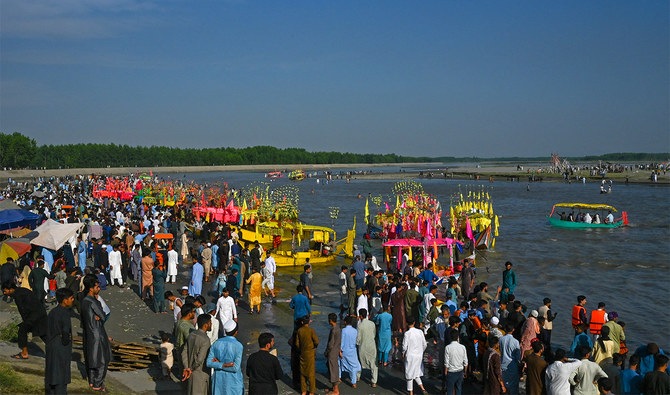Peshawar: Poor weather conditions and soaring inflation led to a staggering 74% decline in the number of tourists that visited Pakistan's northwestern Khyber Pakhtunkhwa province during this year's Eid holidays compared to last year, government officials and tour operators have said.
The northwestern province is home to many picturesque locations and scenic spots such as Swat Valley, Malam Jabba, Abbottabad, Kaghan, and Shogran that Pakistanis from all over the country visit during the Eid holidays.
This year, however, official documents obtained by Arab News from Khyber Pakhtunkhwa's Culture and Tourism Authority (KPCTA) show that only 86,376 tourists visited the province during the Eid holidays, which fell on April 22-25, compared to last year, when 336,425 tourists visited the province on Eid holidays from May 2-5, a 74% decline.
“Business was equal to none during the Eid Al-Fitr days as very few tourists came to Swat,” tourism company owner Rashid Khan, 28, told Arab News.
Khan has been arranging tours since 2016 and said over the Eid holiday, it was often difficult for him and his team of six to make arrangements due to high demand.
But this year was tough.
“Our business went into loss,” Khan said, citing surging inflation, poor weather conditions, and deteriorating security in the country, particularly KP province, as the main reasons for the steep decline in Eid tourists.
Inflation peaked at 36.4 percent during April 2023, official data shared by the government showed, while food inflation surged to 49.1 percent. Pakistan's inflation has outpaced price gains even in Sri Lanka as its currency continues to depreciate and the South Asian country hikes fuel and energy prices.
“We attended to around 150 tourists from Pakistan and foreign countries in 2021, but this year, only 10 tourists have taken our services," said Khan, who also had to reduce his prices.
“We charge Rs120,000-150,000 ($422-528) for a five-day trip from one group," he said, adding that this year he dropped the charges to Rs80,000 ($281).
“The situation is tough and we are paying the company's expenses from [our own] pocket," he said.
Another reason for the decline in Eid tourism was poor weather in the days leading up to the Eid holidays. The Provincial Disaster Management Authority (PDMA) issued a notification on April 13 that thunderstorms with isolated heavy rainfall were predicted in Khyber Pakhtunkhwa from April 15-20, the days right before Eid.
KPCTA spokesman Saad Bin Awais said the Bahrain-Kalam road, which runs along the Swat valley river, was blocked due to floods on April 18 and 19. Another main road connecting the Naran and Kaghan alpine valley in the Mansehra district was also closed due to a glacier burst.
"We issued an advisory requesting the tourists not to visit northern areas to avoid any mishap," Awais told Arab News, verifying the drop in the number of tourists this year.
Asked about losses incurred by KPCTA this season, he added:
“This looks like a huge financial loss to the authority, we will figure out the exact loss at the end of the summer season in the first week of September 2023.”
PDMA Spokesperson Taimur Ali said the administration was on alert throughout the Eid holidays as various routes to tourist spots were "cut off" due to urban flooding in Khyber Pakhtunkhwa's Swat-Bahrain areas.
"The department directed relevant departments to clear the routes,” he said, “but it was too difficult as the incidents happened too close to the Eid days.”












